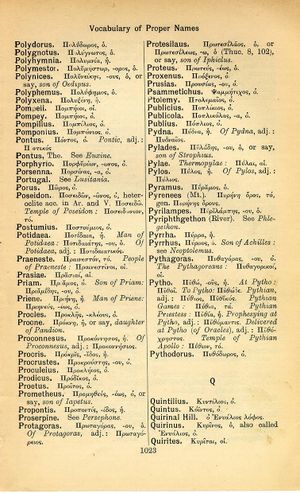Polynices
οὐκ ἐπιλογιζόμενος ὅτι ἅμα μὲν ὀδύρῃ τὴν ἀναισθησίαν, ἅμα δὲ ἀλγεῖς ἐπὶ σήψεσι καὶ στερήσει τῶν ἡδέων, ὥσπερ εἰς ἕτερον ζῆν ἀποθανούμενος, ἀλλ᾿ οὐκ εἰς παντελῆ μεταβαλῶν ἀναισθησίαν καὶ τὴν αὐτὴν τῇ πρὸ τῆς γενέσεως → you do not consider that you are at one and the same time lamenting your want of sensation, and pained at the idea of your rotting away, and of being deprived of what is pleasant, as if you are to die and live in another state, and not to pass into insensibility complete, and the same as that before you were born
English > Greek (Woodhouse)
Πολυνείκης, -ους, ὁ, or say, son of Oedipus.
Latin > English (Lewis & Short)
Pŏlȳnīces: is, m., = Πολυνείκης,
I son of Œdipus and Jocasta, brother of Eteocles, and son-in-law of Adrastus, Stat. Th. 7, 689; Hyg. Fab. 68; 72; Quint. 5, 10, 31; Plin. 35, 11, 40, § 144.
Latin > French (Gaffiot 2016)
Pŏlўnīcēs, is, m. (Πολυνείκης), Polynice [fils d’Œdipe et frère d’Étéocle] : Plin. 35, 144.

